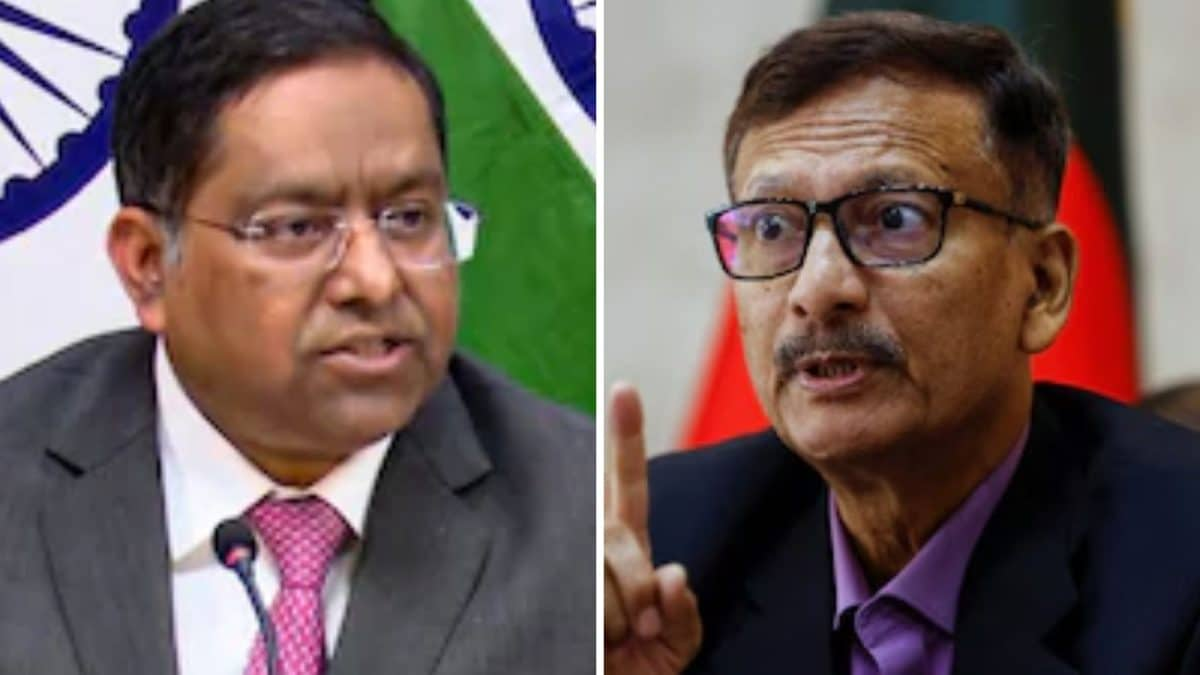Last Updated:October 28, 2025, 10:32 IST
The US Constitution limits presidents to two terms. Yet Trump’s hints about ‘serving more than eight years’, with discussions among his supporters about 'changing the rules'

Donald Trump has now been elected president twice: first in 2016, and again in 2024. The 22nd Amendment makes him ineligible to be elected president a third time. (Getty Images)
Donald Trump’s return to the White House in 2025 — after winning a non-consecutive second term — has reignited a fiery debate in American politics: Can he run again in 2028? The question, seemingly hypothetical, strikes at the core of American constitutional limits, presidential power, and the very idea of democratic rotation in office.
At first glance, the answer appears simple: the US Constitution limits presidents to two terms. Yet Trump’s own hints about “serving more than eight years," coupled with discussions among his supporters about “changing the rules," have kept the question alive. Could Trump, one of the most polarising figures in modern American politics, somehow find a way to stay beyond 2029?
Let us take a detailed look at what the Constitution actually says, how the law has been interpreted, the loopholes people have floated, and whether any path realistically exists for a third Trump presidency in 2028.
Who Followed The Two-Term Rule?
For much of US history, the two-term limit was an informal tradition rather than a constitutional rule. George Washington set the precedent by voluntarily stepping down after two terms in 1797, warning against the dangers of power concentration in one person’s hands. Every president followed his lead—until Franklin D. Roosevelt.
Roosevelt broke the tradition by winning four consecutive terms between 1932 and 1944, steering the country through the Great Depression and World War II. His extended presidency prompted fears that a leader could entrench himself in power indefinitely. In response, Congress proposed the Twenty-Second Amendment, which was ratified by the states in 1951.
The amendment’s key line reads: “No person shall be elected to the office of the President more than twice…" This single sentence has since defined the modern limits of presidential power. It does not merely suggest a two-term cap—it codifies it into law.
What The 22nd Amendment Means For Trump
Trump has now been elected president twice: first in 2016, and again in 2024. Under the plain language of the 22nd Amendment, that makes him ineligible to be elected president a third time.
The amendment does not leave much room for ambiguity. If you have been elected twice, that’s it. You cannot run for and win the presidency again. The intention was to prevent another Roosevelt-style tenure and maintain a clear line of democratic succession.
However, because the amendment specifically says “elected," not “serve," it has given rise to a range of speculative arguments and hypotheticals.
The “Elected" vs. “Serve" Debate
One of the most discussed ambiguities in constitutional law regarding presidential terms lies in the wording of the amendment itself. It restricts a person from being “elected" more than twice—but does not explicitly forbid someone from serving as president again under other circumstances.
This subtle linguistic distinction has fuelled theories about whether a twice-elected president could return to office without being directly elected, perhaps through the line of succession.
For example:
Could Trump serve as Vice President, then assume the presidency if the elected president resigns or is removed?Could he become Speaker of the House and ascend to the presidency if both the President and Vice President were unable to serve?These hypotheticals have fascinated constitutional theorists for decades, but they remain legally untested.
What About The Vice-Presidential Term?
The most common “what if" scenario involves Trump becoming Vice President. Imagine a future Republican candidate winning the presidency in 2028 with Trump as their running mate. If that president later steps down, Trump could, in theory, become president through succession—not by being elected.
But here’s the catch: The Twelfth Amendment to the Constitution says that “no person constitutionally ineligible to the office of President shall be eligible to that of Vice President."
In simple terms, if you cannot legally be president, you cannot be vice president either.
The Supreme Court has never directly ruled on whether being “ineligible" includes those barred from election by the 22nd Amendment. But most constitutional experts believe it does. If you cannot be elected president again, you are also ineligible to serve as vice president. Therefore, this supposed loophole likely collapses under constitutional scrutiny.
Could The Constitution Be Changed?
Technically, yes. The 22nd Amendment can be repealed or altered through another constitutional amendment. But the process is designed to be extraordinarily difficult.
Here’s what it would take:
Proposal: Two-thirds of both the House and the Senate must approve an amendment, or two-thirds of state legislatures (34 states) must call for a constitutional convention.
Ratification: Three-quarters of the states (38) must approve the change.
In today’s polarised political climate, that level of consensus is almost unimaginable. Repealing a term limit to benefit one individual would likely meet overwhelming resistance, not just from Democrats but also from many Republicans wary of setting a dangerous precedent.
While a handful of Trump allies in Congress have floated the idea of revising the amendment—specifically to allow non-consecutive third terms—such efforts are more symbolic than practical. The political math simply doesn’t add up.
What Trump’s Third Term Would Look Like?
To understand just how far-fetched a third Trump term would be, it is useful to look at every conceivable pathway and the obstacles each faces.
Running ‘Normally’ In 2028Trump could theoretically file to run for president again in 2028. However, election officials or courts would almost certainly bar his candidacy under the 22nd Amendment. Any state that placed him on the ballot would face immediate legal challenges, and even if he won, Congress could refuse to certify the result.
Likelihood: Near zero. The constitutional text clearly prohibits this route.
Becoming Vice PresidentAs explained earlier, this would likely be blocked by the Twelfth Amendment. Even if Trump were placed on a ticket as V-P and won, his eligibility would be challenged in court long before inauguration day.
Likelihood: Extremely low, with near-certain legal intervention.
Succession Without ElectionCould Trump somehow ascend to the presidency through a different line of succession—say, as Speaker of the House? Theoretically, yes: The Speaker is third in line, after the Vice President. But again, constitutional eligibility would likely be challenged the moment he assumed office. Congress, the courts, and possibly even the military would face a constitutional crisis.
Likelihood: Legally questionable, politically explosive.
Amending Or Repealing The 22nd AmendmentThis is the only lawful way to make Trump eligible again. But passing a new amendment before 2028 would be virtually impossible. Constitutional amendments take years—sometimes decades—to ratify. The last successful amendment, the 27th (on congressional pay), took over 200 years to become law.
Likelihood: Practically zero within this timeframe.
What About The Supreme Court?
If Trump were to somehow pursue any of these routes, the matter would almost certainly end up before the Supreme Court. The justices would have to interpret the meaning of “elected" and decide whether it bars not only direct elections but also any form of return to office.
Given the clear intent of the 22nd Amendment—to prevent any one person from holding the presidency more than twice—the court would likely rule against a third Trump term. Upholding the spirit of term limits has been a consistent theme in American constitutional interpretation.
Moreover, allowing a loophole could set a precedent that any future leader could exploit, effectively nullifying the term-limit safeguard altogether.
The Politics Of ‘Testing The System’
Even if the legal barriers are clear, Trump’s political style has often revolved around testing limits. His rhetoric about “serving more than eight years" might not reflect a concrete plan but rather a way to keep his base energized and his opponents unsettled.
Floating the idea of a third term fits neatly into Trump’s populist narrative of challenging the “deep state" and defying the establishment. Whether he truly believes he could legally do it—or simply enjoys the spectacle—remains unclear.
But one thing is certain: even the suggestion of a third Trump run would throw the 2028 election cycle into chaos, trigger a constitutional standoff, and dominate the national conversation for years.
Why The Term Limit Matters
The two-term limit is not just a procedural rule; it is a symbol of the peaceful transfer of power — the cornerstone of American democracy. The framers of the amendment wanted to ensure that no leader, no matter how popular, could dominate the political system indefinitely.
Allowing a president to serve beyond that limit, even under creative legal interpretations, would weaken one of the most fundamental checks in US governance. It could open the door for future presidents to manipulate the system and erode democratic norms.
So, Can Trump Run Again In 2028?
Under current constitutional law, no. Donald Trump cannot legally be elected to a third term in 2028.
The Twenty-Second Amendment clearly restricts the presidency to two elections. No matter how one interprets the word “elected," any attempt to re-enter office would face insurmountable legal and political obstacles.
There is no credible loophole, no quick fix, and no realistic timeline for an amendment before 2028. Even if such an effort began today, it would likely fail in Congress or the states long before reaching ratification.
In short, the only way Trump could return for a third term is if the American people, through an arduous constitutional process, change the rules themselves. And at this point, there is little evidence that such a movement exists beyond the fringes of political discussion.
What To Conclude?
The 22nd Amendment stands as a guardrail against perpetual presidency. It reflects America’s deep-seated belief that no one should remain in the Oval Office indefinitely.
Trump’s speculation about serving beyond eight years may make headlines, but the Constitution leaves little room for interpretation. Unless America chooses to rewrite one of its most defining democratic safeguards, Trump’s second presidency will also be his last.
Shilpy Bisht, Deputy News Editor at News18, writes and edits national, world and business stories. She started off as a print journalist, and then transitioned to online, in her 12 years of experience. Her prev...Read More
Shilpy Bisht, Deputy News Editor at News18, writes and edits national, world and business stories. She started off as a print journalist, and then transitioned to online, in her 12 years of experience. Her prev...
Read More
First Published:
October 28, 2025, 10:32 IST
News explainers Can Trump Really Run For A Third Term In 2028? Here’s What The US Constitution Says
Disclaimer: Comments reflect users’ views, not News18’s. Please keep discussions respectful and constructive. Abusive, defamatory, or illegal comments will be removed. News18 may disable any comment at its discretion. By posting, you agree to our Terms of Use and Privacy Policy.
Stay Ahead, Read Faster
Scan the QR code to download the News18 app and enjoy a seamless news experience anytime, anywhere.


 1 month ago
1 month ago















